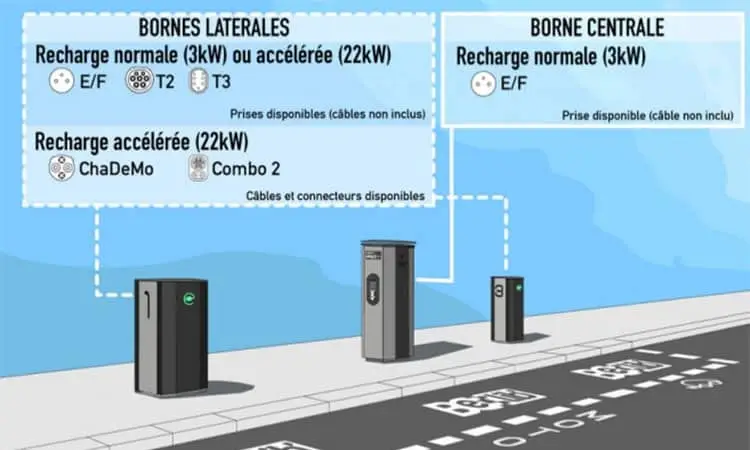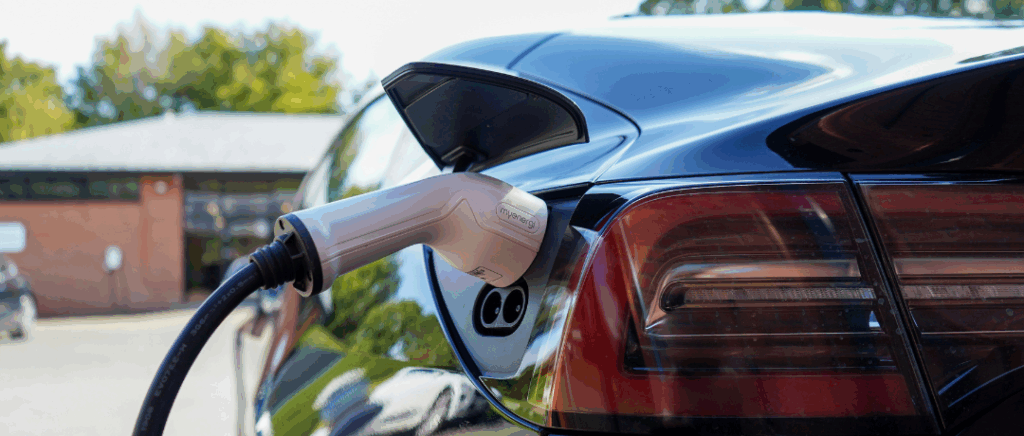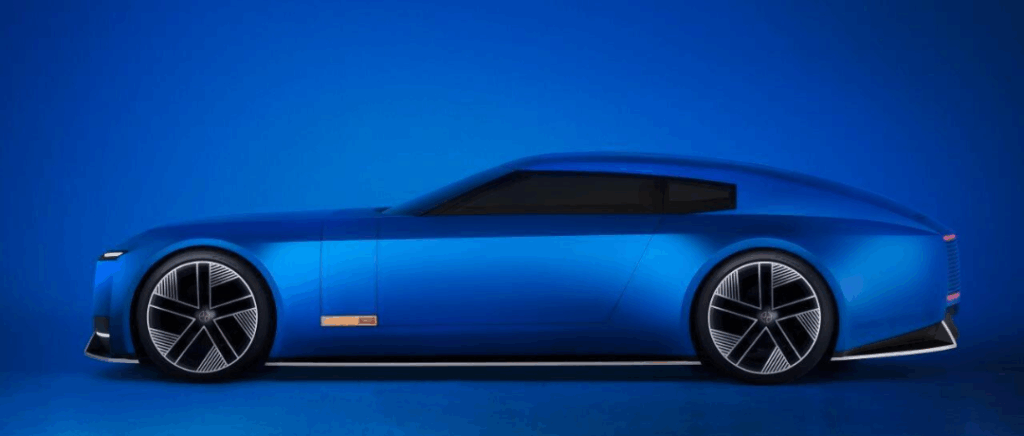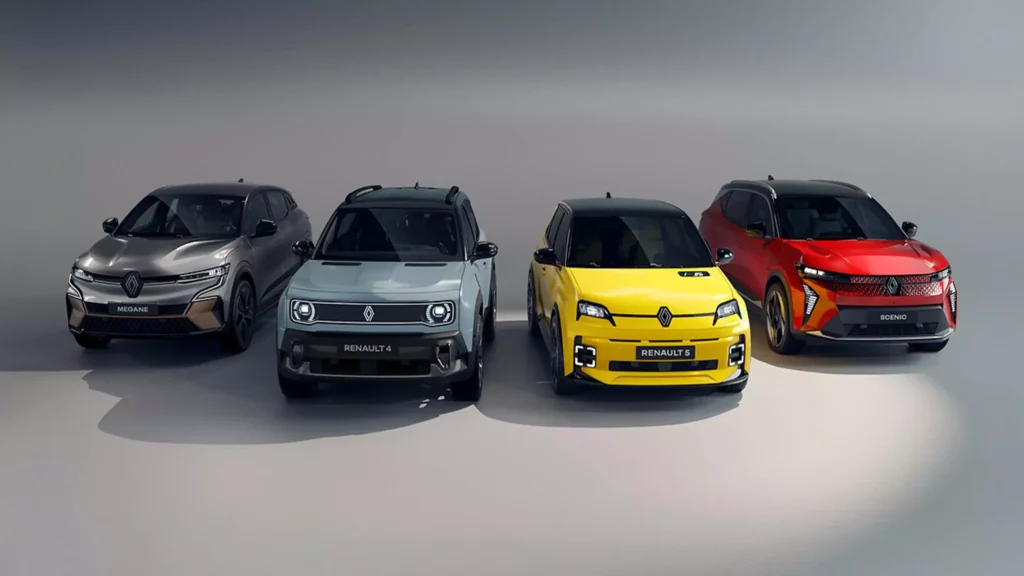Monday to Friday
9am - 12.30pm - 2pm - 7pm
What is the current state of therecharging infrastructure in Paris?
How do electric car recharging facilities work in Paris?
Paris has taken an active approach to supporting the transition to electric mobility, which is reflected in the deployment of a network of charging stations open to electric and plug-in hybrid vehicles. At the heart of this infrastructure is the Belib' public charging network in Paris, operated by Total Marketing France. Launched in March 2021, Belib' has around 430 stationsrepresenting more than 2000 charging pointsThese include fast-charging stations located in certain dedicated car parks.
Belib' charging stations offer a maximum power of 22 kWcompatible with a wide variety of vehicles, thanks to its plugs T2, T3, domestic, Combo, and CHAdeMo available. Drivers of electric cars can register on the Belib' website to access the service, which is designed to be easily accessible and to meet their needs.
In terms of costs, the use of Belib' terminals in Paris is structured around a pricing model based on the time of day.
| Type de Recharge | Journée (8 h – 20 h) | Nuit (20 h – 8 h) |
|---|---|---|
|
Normal charge (3 kW)
|
1 € / hour
|
Free
|
|
Accelerated Recharge (22 kW)
|
0.25 / 15 minutes (€1 / hour) for the first hour
|
0.25 / 15 minutes (€1 / hour) for the first hour
|
|
|
2 for the first 15 minutes
|
2 for the first 15 minutes
|
|
|
Followed by €4 / quarter of an hour
|
Followed by €4 / quarter of an hour
|
To obtain access to the Belib' recharging network, a badge must be requested at a cost of €15. There is no monthly or annual subscription, and users only pay according to how much they use the charging points.

These infrastructures play a crucial role in adapting Paris to the needs of electric vehicle drivers, providing flexible recharging options and promoting sustainable urban mobility.
Also read → Charging stations: what's the current state of deployment?
The necessary expansion of the network of charging points
Expanding the network of charging points in Paris and across France is crucial to keeping pace with the growing number of electric vehicles. France has already achieved a major target of 100,000 public charging points, making it the second best-equipped country in Europe after the Netherlands. However, the government is aiming to an ambitious target of 400,000 terminals to be installed by 2030 to meet growing demand.
Major players such as Engie are actively participating in this expansion. With Vianeo, Engie plans to add 12,000 charge points by 2025, including 4 500 ultra-fast charging, which enables vehicles to be recharged in less than twenty minutes. These initiatives are supported by the annual growth in sales of electric vehicles, which is rising by 20 to 25 %.
At the same time, Izivia, a wholly-owned % subsidiary of EDF, is playing a leading role in the deployment of fast-charging stations. It has launched the Corri-Door network, placing charging points every 80 km on average on major French roads. Izivia has also added 300 additional fast-charging stations to its network from 2022, increasing the number of charging stations and their accessibility outside motorways, particularly in shopping areas or on the outskirts of major cities.
These efforts between the public and private sectors illustrate the commitment to electromobility and the need for a well-developed recharging infrastructure to further encourage the uptake of electric vehicles. Collaboration between energy suppliers, local authorities and electric mobility operators is essential if we are to achieve the ambitious targets set by the government and ensure a smooth energy transition. to more sustainable modes of transport.
Paris 2024 initiatives for sustainable mobility
Towards more responsible Olympic Games: Paris 2024's commitment
Paris 2024 aims to organise environmentally-friendly Olympic Games, aligned with significant sustainable initiatives to reduce carbon emissions and promote sustainable mobility. This ambition is based on several strategic pillars and concrete actions aimed at minimising the ecological footprint of the event, while leaving a lasting legacy for the community and the environment.
Responsible and sustainable infrastructure
Paris 2024 has placed particular emphasis on the reduction of greenhouse gas emissions.carbon footprint Opting for the majority of existing and temporary infrastructures, thus limiting the need for new construction. The aquatic centre, the only competition venue built specifically for the Games, is an example of sustainable construction. Using wood for its main structure has significantly reduced carbon emissions compared to the traditional use of concrete and steel. In addition, the use of solar energy and the recovery of heat from a nearby data storage centre are helping to reduce energy consumption.
Energy transition as a key element
Renewable energy is at the heart of Paris 2024's strategy. All Games venues will be connected to the electricity grid and supplied with 100 % renewable electricity. This approach will save around 13,000 tonnes of CO2. Paris 2024 is also adopting innovative technologies, such as retractable electricity terminals for certain temporary venues, thereby reducing the use of diesel generators and their associated emissions.
Accessibility to promote sustainable mobility
Encouraging the use of public transport and soft mobility, Paris 2024 is ensuring that the venues are accessible via a diversified and environmentally-friendly transport network. The organisation is also planning to use electric and hydrogen-powered vehicles for official purposes, in addition to installing electric charging stations to promote cleaner mobility.
Waste management for a more responsible diet
Reducing waste, in particular by limiting the use of single-use plastic, and offering local and plant-based food options demonstrate Paris 2024's commitment to a greener event model. The organisation aims to significantly reduce the waste generated and encourage sustainable food practices among participants and spectators.
Leaving a lasting impression
Paris 2024 aspires to leave a lasting legacy, not only through environmentally friendly infrastructure, but also through education and community engagement around sustainable development and environmental responsibility. Projects such as the transformation of the Olympic Village into eco-friendly post-Games housing illustrate this long-term ambition.
All these initiatives are part of a wider framework of sustainable development strategies and environmental legislation supported by the French government and international bodies, such as the IOC's Olympic Agenda 2020, which aims to make the Olympic Games a model of sustainability and environmental responsibility.
Paris is therefore firmly committed to organising innovative and responsible Olympic Games, which will serve as a benchmark for future editions of the Games and beyond, thus contributing to the evolution of standards in the organisation of world sporting events.
Paris 2024's electric mobility initiatives
Whether it is organising the Olympic Games or the Paralympic Games, Paris 2024 is firmly committed to promoting electric and sustainable mobility. This initiative is part of a global approach aimed at reducing the event's carbon footprint and promoting inclusive mobility for all participants and visitors.
Working with Toyota for sustainable mobility
In partnership with the International Olympic Committee (IOC), the International Paralympic Committee (IPC) and the Paris Organising Committee for the Olympic and Paralympic Games, Toyota, as a global mobility partner, will play a key role in implementing sustainable and inclusive mobility solutions.
Toyota will provide approximately 250 personal electric vehicles, wheelchair e-pushers available in the athletes' village, and 250 zero-emission Accessible People Movers (APMs) to facilitate the transportation of all athletes as well as organisers, volunteers and spectators, including those with reduced mobility. These electric vehicles and personal micro-mobility solutions will be shared via the KINTO Share mobile application, optimising their use during the Games.
A commitment to the electrification of transport
Toyota will also contribute to the effort to reduce its carbon footprint with a fleet of more than 2,650 electrified vehicles, 150 of which are wheelchair accessible. Approximately 60 % of this fleet will be zero-emission vehicles, including zero-emission electric vehicles. battery and fuel cell electric vehicles (FCEVs), such as the Toyota Mirai. These vehicles will play a crucial role in transporting the Olympic and Paralympic family, athletes, organisers and volunteers, thereby contributing to a more sustainable event.
Working with Île-de-France Mobilités
Île-de-France Mobilités, the organising authority for all transport in Île-de-France, is playing a key role in transport during the Games, with a commitment to increase public transport provision for the millions of spectators expected to attend. The collaboration between Paris 2024 and Île-de-France Mobilités aims to ensure that 100 % of spectators can access the competition venues by public or active modes of transport, in line with the commitments made during Paris 2024's bid. This initiative reflects the ambition to create a lasting mobility legacy for Île-de-France, with infrastructure and services that will benefit residents and visitors well beyond the Games.
These actions by Paris 2024 to promote electric and sustainable mobility demonstrate the Organising Committee's deep commitment to minimising the environmental impact of the Games and encouraging a transition to greener transport solutions. These actions are part of a broader vision to leave a lasting legacy for the city of Paris and its residents, as well as for the Olympic and Paralympic movement as a whole.
Also read → Sustainable mobility, issues and solutions
What are the objectives for the electric recharging infrastructure in Paris?
Developing a strategy for the deployment of charging points
To support the increase in the number of electric vehicles in Paris and improve access to recharging, the City of Paris, in collaboration with its partners, has put in place an ambitious strategy for the deployment of electric recharging infrastructure:
- The international standard EN IEC 61851 regulating the installation and characteristics of recharging stations, guaranteeing their safety and efficient operation.
- Le EV Ready labelThis is an initiative by several major carmakers to certify the compatibility and safety of recharging infrastructures, highlighting the importance of interoperability between public charging points.
- La Mobility Orientation Act (LOM) stressing the urgent need to extend the network of recharging facilities in businesses, by requiring the installation of charging points in car parks with more than 20 spaces.
Anticipating future challenges
As part of Paris' ambitious targets for the deployment of its electric charging infrastructure, a number of initiatives and challenges are looming on the horizon, requiring careful anticipation and planning.
Electra, a key player in the electric vehicle charging sector, has embarked on a major initiative to meet the growing demand for high-performance charging stations. With the support of the Banque des Territoires, Electra plans to build 1,000 ultra-fast charging stations in Paris by 2030. The aim of this expansion is to make up for the shortage of charging stations and improve the user experience, by making recharging as quick and easy as filling up with traditional petrol. Electra's ultra-fast stations aim to ensure that users are always less than 10 minutes from a charging station, with the option of on-demand booking for fast charging.
For its part, ADEME has launched a programme to encourage investment in electric charging infrastructure open to the public. The programme targets companies distributing fuel for road use, and offers subsidies for the deployment of charging stations, underlining the importance of greater accessibility to electric charging. Subsidies are calculated according to the cumulative power of the installation, with ceilings of up to €105,000 for the most powerful installations.
The main future challenges for recharging infrastructure in Paris are increasing the capacity of recharging stations to meet growing demand, improving the reliability of charging points to reduce malfunctions, and expanding the network geographically to provide even coverage across the whole of Paris. Collaboration between the public and private sectors, as well as innovation in charging technologies, will be essential to overcome these obstacles and ensure a successful transition to electric mobility.
By anticipating these challenges, Paris and its partners are committed to developing a robust and accessible electric recharging infrastructure, which is essential to support the energy transition and meet tomorrow's mobility needs.
Also read → What challenges will electric car charging infrastructures face in 2024?
Conclusion
In the run-up to the Olympic Games, Paris is positioning itself as a model of electric mobility thanks to the expansion of its recharging infrastructure. These coordinated efforts between the public and private sectors, underlined by the expansion of the Belib' network, Electra's initiatives, and the support of ADEME, ensure not only a green transition but also an enhanced user experience for residents and visitors. These measures effectively anticipate future challenges, demonstrating Paris' commitment to a sustainable and welcoming future for all.
If you would like to find out more about the tax credit for in-car charging points 2024For more information, see our article on this subject.
































